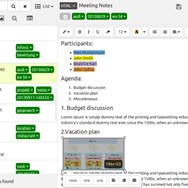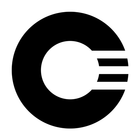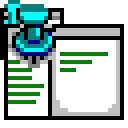
TagSpaces
TagSpaces is a versatile, open-source application for organizing digital files across multiple platforms using a flexible tagging system. It allows users to manage documents, notes, photos, and more directly on their local storage or synced cloud drives, enhancing discoverability without relying on central databases or proprietary formats. Ideal for individuals seeking robust offline file management and knowledge organization.
License
FreemiumPlatforms
About TagSpaces
Key capabilities include:
- Flexible Tagging System: Assign multiple tags to any file or folder, creating a powerful, non-hierarchical method for categorization and retrieval.
- Integrated Viewer and Editor: Open and edit various file types, including text documents, markdown files, images, and even some office formats, directly within the application.
- Offline First Design: Operates entirely on your local storage, offering exceptional speed and privacy without requiring an internet connection for core functionality.
- Cross-Platform Compatibility: Available on Windows, macOS, Linux, Android, and as a browser extension, allowing you to manage your files consistently across all your devices.
- Extensibility through Extensions: Enhance TagSpaces' capabilities with a growing library of extensions for features like PDF annotation, Kanban boards, and more.
- Powerful Search Functionality: Quickly find files based on tags, file names, or even content within supported file types.
- Privacy and Security: Since data resides locally, you maintain complete control over your sensitive information.
Pros & Cons
Pros
- Database-free and portable organization via file tagging.
- Works entirely offline, ensuring data privacy and speed.
- Cross-platform availability across desktop and mobile.
- Built-in viewers and editors for various file types.
- Extensible through a plugin system for added functionality.
Cons
- Can require a learning curve for users unfamiliar with tag-based systems.
- File name length can become long if tags are embedded directly.
- Advanced features and integrations may rely on third-party extensions.
What Makes TagSpaces Stand Out
Database-Free Organization
Stores metadata directly within the file path or alongside files, ensuring portability and long-term accessibility without a central database.
Privacy-Focused Offline Operation
Functions entirely on your local storage, giving you complete control and privacy over your data without relying on online services.
Flexible Tagging System
Offers a powerful and non-hierarchical way to organize files that overcomes the limitations of traditional folder structures.
Features & Capabilities
15 featuresExpert Review
Comprehensive Review of TagSpaces
TagSpaces presents itself as an innovative solution for digital file management, moving beyond traditional hierarchical folder structures to embrace a tag-based approach. At its core, TagSpaces aims to provide users with a flexible, platform-independent, and privacy-conscious method for organizing their ever-growing collection of digital content.
One of the most significant aspects of TagSpaces is its inherent portability. By embedding tags directly into file names or accompanying sidecar files, the organizational structure is intricately linked with the files themselves. This design choice means that your carefully tagged documents, photos, and notes remain organized even when moved to a different drive, synced via cloud storage, or accessed outside of the TagSpaces application using a standard file explorer. This database-free approach is a refreshing departure from many other knowledge management systems that lock you into a specific application or proprietary format. It provides a high degree of future-proofing and reduces vendor lock-in.
The application's user interface is functional and generally intuitive, although it may require a short learning curve for users accustomed solely to traditional file navigation. The main interface is typically divided into several panes: a navigation panel for browsing locations, a file list displaying content within the selected location, and often a preview or editing pane for the selected file. The visual tagging feature is particularly helpful, allowing users to quickly see and manage the tags associated with each file.
Beyond just file management, TagSpaces incorporates a range of built-in viewers and editors for common file types. This allows users to open, edit, and interact with documents, images, and even code snippets directly within the application. The integrated Markdown editor is a notable feature for users who prefer plain text for note-taking and writing. The ability to preview various formats without opening external applications streamlines the workflow significantly.
The extensibility of TagSpaces through its plugin system adds another layer of value. Users can install extensions to add support for new file types, integrate with external services, or introduce new functionalities like Kanban boards or PDF annotation. This modular design allows users to tailor TagSpaces to their specific needs and workflows, expanding its capabilities beyond the core feature set.
Search functionality is crucial for any file manager that relies on metadata, and TagSpaces provides robust searching capabilities. Users can search by file name, tags, and, importantly, content within supported file types. The indexed search feature helps speed up the retrieval process, allowing users to quickly locate specific information within their vast collections of files.
The offline-first design is a major plus for privacy-conscious users and those who frequently work without a reliable internet connection. Since all data and operations are local, there's no reliance on external servers for core functionality, enhancing both speed and data security.
Cross-platform availability is another strong point. TagSpaces is available on Windows, macOS, and Linux for desktop users, and there’s an Android version, making it possible to manage your files consistently across different devices. While the user experience can vary slightly between platforms, the core functionality remains the same.
While TagSpaces offers many compelling features, there are areas where users might find limitations. As an open-source project, the development pace and availability of advanced features might differ compared to commercially backed software. The reliance on embedded metadata can sometimes lead to file name lengths becoming extensive, although TagSpaces offers options to mitigate this, such as using sidecar files. Integration with certain cloud storage providers for automatic syncing is possible but typically relies on the cloud provider's sync client rather than being deeply integrated into TagSpaces itself. The complexity of managing tags and maintaining consistency across a very large and diverse file collection requires user discipline.
In conclusion, TagSpaces is a powerful and well-conceived application for individuals seeking a flexible, private, and platform-independent method for organizing their digital life. Its tag-based approach, offline-first design, and extensibility make it a strong contender for users who want to take control of their data and move beyond the limitations of traditional file systems and proprietary database solutions. It is particularly well-suited for knowledge workers, students, and anyone who deals with a significant volume of diverse digital files and values long-term data accessibility and privacy.















